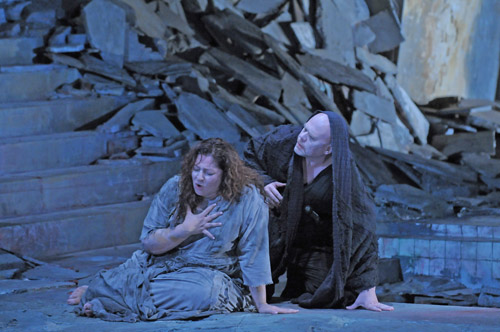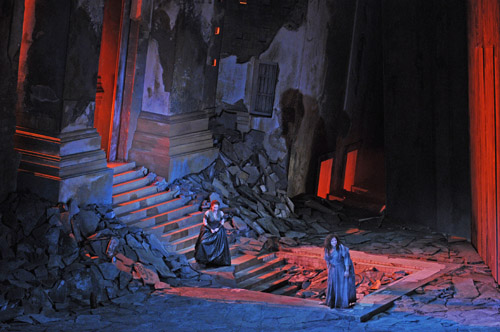 United States Richard Strauss, Elektra: Soloists, Lyric Opera of Chicago, Sir Andrew Davis (conductor), Civic Opera House, Chicago. 6.10.2012 (JLZ)
United States Richard Strauss, Elektra: Soloists, Lyric Opera of Chicago, Sir Andrew Davis (conductor), Civic Opera House, Chicago. 6.10.2012 (JLZ)
Cast
Elektra: Christine Goerke
Chrysothemis: Emily Magee
Clytemnestra: Jill Grove
Orestes: Alan Held
Aegisthus: Roger Honeywell
Overseer: Elizabeth Byrne
Orestes’s Tutor: Jason Stearns
First Maid: Victoria Livengood
Second Maid: J’nai Bridges
Third Maid: Cecelia Hall
Fourth Maid: Rebecca Nash
Fifth Made: Trancy Cantin
Overseer: Elizabeth Byrn
Confidante: Kiri Deonarinet
Train Bearer: Emily Birsan
Young Servant: Bernard Holcomb
Old Servant: Kenneth Nichols
Production
Conductor: Sir Andrew Davis
Director: Sir David McVicar
Designer: John Macfarlane
Lighting Designer: Jennifer Tipton
Chorus Master: Martin Wright
Choreographer: August Tye

As shocking as Richard Strauss’s Elektra was at its premiere in 1908, the opera is no less stunning a century later, and it is an outstanding choice for Lyric Opera of Chicago to open its 2012–2013 season. Hugo von Hofmannsthal’s libretto is based on his 1903 play, a modern version of Sophocles’s drama. In collaborating with Hofmannsthal, Strauss shaped the music and text to create a single-act opera of incredible power, which came to life vibrantly on opening night of this new production at Lyric Opera of Chicago.
In the title role, Christine Goerke gave an exceptional performance, which was faithful to the score in terms technically and musically. Goerke captured the essence of Elektra from the start, with her brooding presence at the back of the stage prefacing her first lines in the monologue (“Allein! Weh, ganz allein”). Goerke eloquently maintained a sense of line and drama, communicating intensity both in tone and dynamic levels. As her vengeance became a driving force that consumed her and those near her, Goerke’s fine sense of pitch and her ringing tone served her well. Dramatically she was convincing in her obsessiveness, adding dignity to a role that sometimes suffers from depictions of madness for its own sake.
As Clytaemnestra, Jill Groves was equally persuasive, delivering the musical line so the text could be heard distinctly, and in her phrasing, only emphasizing Clytaemnestra’s complexity. The antipathy between mother and daughter was especially pointed in the duet (“Ich habe keine guten Nächte”) in which Elektra reveals the solution to her mother’s tormented dreams: her death.
Emily Magee was also impressive as Chrysothemis, and her duet with Elektra, “Schwester, sprichst du von der Mutter,” was particularly memorable. As their brother, Orestes, Alan Held was powerfully articulate, and made a well-considered first entrance, letting his sheer presence make an impression before he began to sing. Held’s extended exchange with Elektra gave the audience more time to appreciate his interpretation.
These four characters were matched by well-cast supporting roles, especially Roger Honeywell as Aegisthus. Yet Goerke remained the dominant force. The opening night audience demonstrated its appreciation with resounding applause at the curtain calls.
Sir Andrew Davis offered excellent leadership, shaping the score with intelligence. Distinction between scenes was audible, yet elements of continuity were clearly articulated in the orchestra. Balances were rich and colorful, with full, resonant sonorities.

John Macfarlane’s new production, directed by Sir David McVicar, makes use of the full expanse of Lyric’s stage. Unlike some productions of Elektra which scale down the space or use representational backgrounds, this one offers a larger-than-life view of the door of palace, supported steps and quintessential Greek columns, with the entire structure set askew and framed with rubble. Red is used stylishly, starting with the paint one of the maids leaves on the iron bars that close the palace, and foreshadowing the red that flows at the end of the opera.
A daring choice for the gala opening night, this production was entirely appropriate for the occasion, and Lyric Opera of Chicago rendered Strauss’s outstanding score with the finesse and directness it deserves. This Elektra has much to recommend it, and those who do not yet have tickets should make certain not to miss this impressive, moving production of Strauss’s masterpiece.
James L. Zychowicz